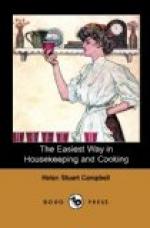In winter venison can be kept a month; and, in all cases, it should hang in a cold place at least a month before using. Allow half an hour to a pound in roasting, and baste very often. Small squares of salt pork are sometimes inserted in incisions made here and there, and help to enrich the gravy. In roasting a haunch it is usually covered with a thick paste of flour and water, and a paper tied over this, not less than four hours being required to roast it. At the end of three, remove the paper and paste, dredge and baste till well browned. The last basting is with a glass of claret; and this, and half a small glass of currant jelly are added to the gravy. Venison steaks are treated as in directions for broiled meats.
BAKED PORK AND BEANS.
Pick over one quart of dried beans, what is known as “navy beans” being the best, and soak over-night in plenty of cold water.
Turn off the water in the morning, and put on to boil in cold water till tender,—at least one hour. An earthen pot is always best for this, as a shallow dish does not allow enough water to keep them from drying. Drain off the water. Put the beans in the pot. Take half a pound of salt pork, fat and lean together being best. Score the skin in small squares with a knife, and bury it, all but the surface of this rind, in the beans. Cover them completely with boiling water. Stir in one tablespoonful of salt, and two of good molasses. Cover, and bake slowly,—not less than five hours,—renewing the water if it bakes away. Take off the cover an hour before they are done, that the pork may brown a little. If pork is disliked, use a large spoonful of butter instead. Cold baked beans can be warmed in a frying-pan with a little water, and are even better than at first, or they can be used in a soup as in directions given. A teaspoonful of made mustard is sometimes stirred in, and gives an excellent flavor to a pot of baked beans. Double the quality if the family is large, as they keep perfectly well in winter, the only season at which so hearty a dish is required, save for laborers.
BROILED AND FRIED MEATS.
If the steak is tender, never pound or chop it. If there is much fat, trim it off, or it will drop on the coals and smoke. If tough, as in the country is very likely to be the case, pounding becomes necessary, but a better method is to use the chopping-knife; not chopping through, but going lightly over the whole surface. Broken as it may seem, it closes at once on the application of a quick heat.
The best broiler is by all means a light wire one, which can be held in the hand and turned quickly. The fire should be quick and hot. Place the steak in the centre of the broiler, and hold it close to the coals an instant on each side, letting both sear over before broiling really begins.




